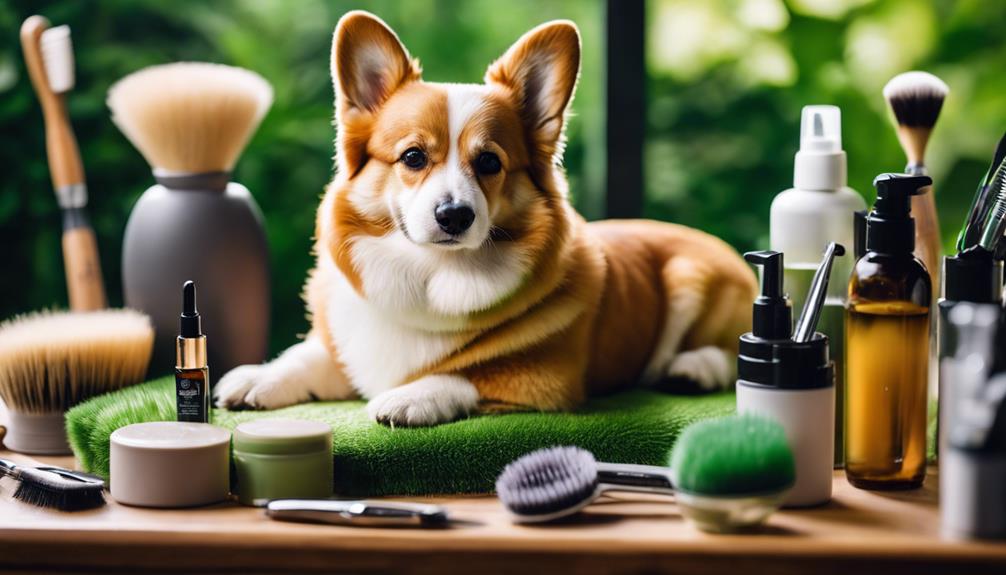Effective grooming is a fundamental aspect of maintaining a Corgi's skin health and overall well-being. Regular grooming practices not only remove debris and dead hair but also play a vital role in preventing potential skin irritations and infections. Selecting appropriate tools and techniques is essential for optimal results. However, the process does not end with brushing; various factors contribute to skin health. Understanding these complexities can significantly enhance your approach to Corgi care, leading to healthier skin and a happier pet. What are some key strategies that should not be overlooked?
Importance of Regular Grooming
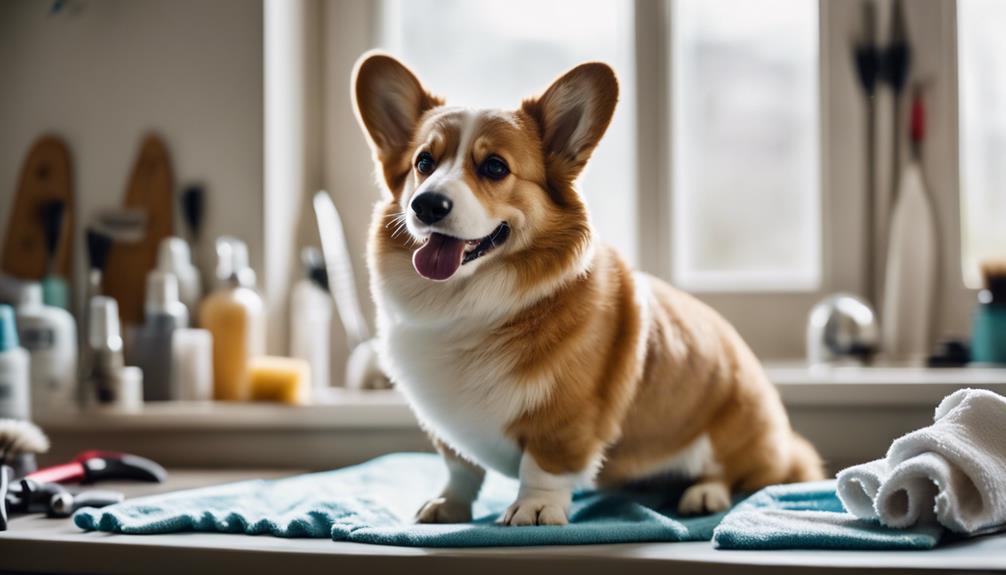
Why is regular grooming essential for maintaining the health and well-being of your Corgi's skin?
Regular grooming offers numerous benefits that significantly contribute to your Corgi's skin health.
First, it helps remove dead hair, dirt, and debris, preventing skin irritations and infections.
Second, grooming stimulates blood circulation, enhancing nutrient delivery to the skin, which can promote a healthy coat.
Third, regular brushing helps distribute natural oils, keeping the skin moisturized and less prone to dryness.
Additionally, grooming provides an opportunity to check for any unusual skin conditions, such as lumps, bumps, or parasites.
Choosing the Right Tools
Selecting the appropriate grooming tools is vital for effectively maintaining your Corgi's skin health and ensuring a comfortable grooming experience. The right tools not only remove dirt and loose hair but also promote healthy skin.
Here are three essential grooming tools you should consider:
- Slicker Brush: Ideal for removing tangles and loose fur, this brush helps prevent matting while stimulating the skin.
- De-shedding Tool: This tool effectively reduces excessive shedding, keeping your home cleaner and protecting your Corgi's skin from irritation.
- Nail Clippers: Regular nail trimming prevents painful overgrowth, contributing to overall comfort.
Regular tool maintenance is crucial. Clean your grooming tools after each use to ensure they remain effective and hygienic.
Proper care extends the life of your tools, enhancing your grooming routine.
Bathing Techniques for Corgis
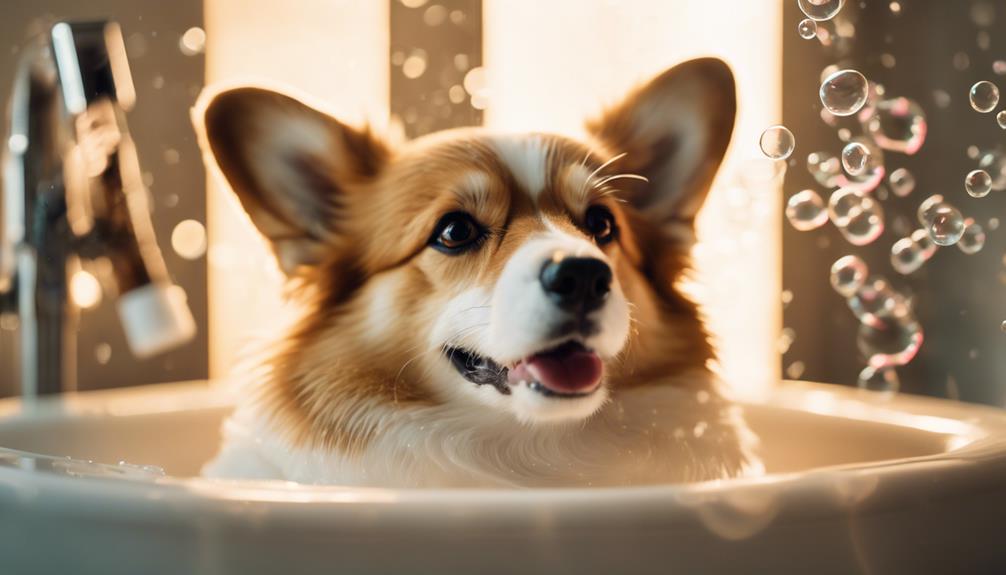
Bathing your Corgi is an essential part of their grooming routine, and selecting the right shampoo is crucial for maintaining their skin health.
It is important to consider factors such as your dog's skin type and any sensitivities they may have when choosing a product.
Additionally, understanding how often to bathe your Corgi can help prevent skin issues while ensuring they remain clean and comfortable.
Choosing the Right Shampoo
Choosing the appropriate shampoo is essential for maintaining a Corgi's skin health, as it helps prevent irritation and supports a shiny, healthy coat.
When selecting a shampoo, consider the following factors:
- Natural ingredients: Look for shampoos made from plant-based components that nourish the skin without harsh chemicals.
- Hypoallergenic options: Choose formulas designed for sensitive skin to minimize allergic reactions and discomfort.
- pH-balanced: Ensure the shampoo is pH-balanced to maintain the skin's natural barrier and avoid dryness.
Bath Frequency Recommendations
Establishing a proper bathing routine is vital for ensuring the overall skin health of Corgis, complementing the benefits of a suitable shampoo.
Bath frequency should typically be every four to six weeks, depending on the dog's activity level and skin sensitivity. Bathing too often can strip natural oils, leading to dryness and irritation, while infrequent baths may cause dirt and allergens to accumulate.
When bathing, use lukewarm water and a gentle, dog-specific shampoo. Rinse thoroughly to remove all soap residue, as leftover product can irritate the skin.
Dry your Corgi completely after the bath, as damp fur can promote skin issues. Regular grooming between baths helps maintain a healthy coat and skin, ensuring your Corgi stays comfortable and happy.
Brushing Frequency and Methods
Regularly brushing your Corgi not only helps remove loose fur and dirt but also promotes healthy skin by distributing natural oils throughout their coat.
Establishing effective grooming schedules is essential for maintaining your dog's coat and skin health. Aim to brush your Corgi at least two to three times a week.
Here are some recommended brushing techniques:
- Slicker Brush: This tool effectively removes tangles and loose fur.
- Undercoat Rake: Ideal for reaching the dense undercoat, especially during shedding season.
- Bristle Brush: Perfect for smoothing the coat and adding shine, while also stimulating the skin.
Nail Care Tips
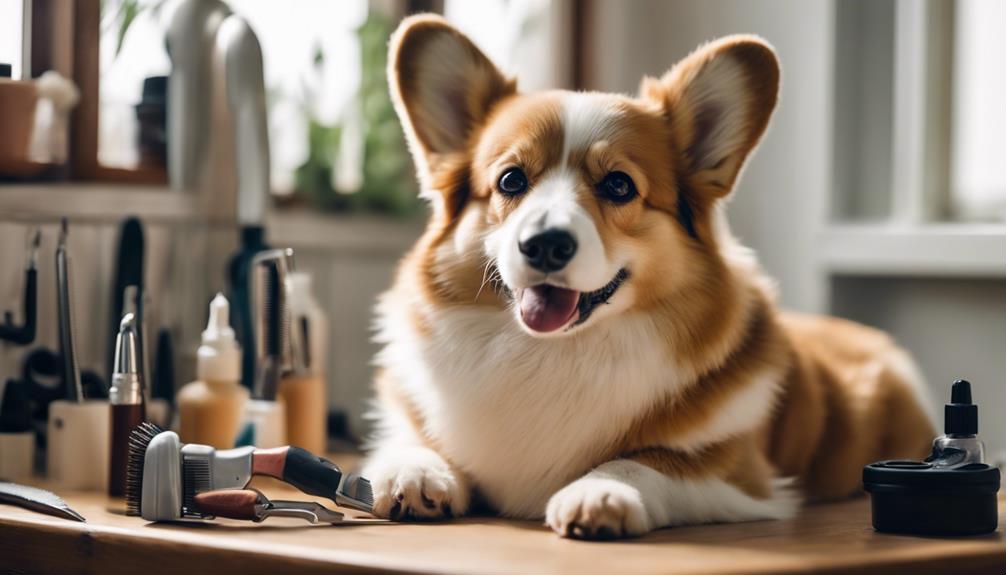
Proper nail care is essential for your Corgi's overall health, as overgrown nails can lead to discomfort and mobility issues.
Regular nail trimming helps maintain proper nail length and prevents painful splitting or cracking. Familiarize yourself with effective nail trimming techniques, such as using a quality nail clipper designed for pets. It's important to trim just the tip of the nail without cutting into the quick, which can cause bleeding and pain.
The nail health benefits include improved comfort when walking and playing, as well as reduced risk of injury.
Aim to check and trim your Corgi's nails every 3-4 weeks. Consistent nail care not only promotes health but also strengthens your bond with your furry friend.
Ear Cleaning Essentials
Maintaining your Corgi's ear health is just as important as attending to their nails, as clean ears are vital for preventing infections and ensuring overall well-being.
Regular ear cleaning helps eliminate excess ear wax and reduces the risk of ear-related issues.
Here are essential steps for effective cleaning:
- Gather Supplies: Use appropriate cleaning solutions specifically designed for dogs, along with cotton balls or pads.
- Inspect Ears: Check for redness, swelling, or any unusual odors, which may indicate infection.
- Clean Gently: Apply the cleaning solution to a cotton ball, gently wipe the outer ear, and avoid inserting anything deep into the ear canal.
Skin Hydration Strategies
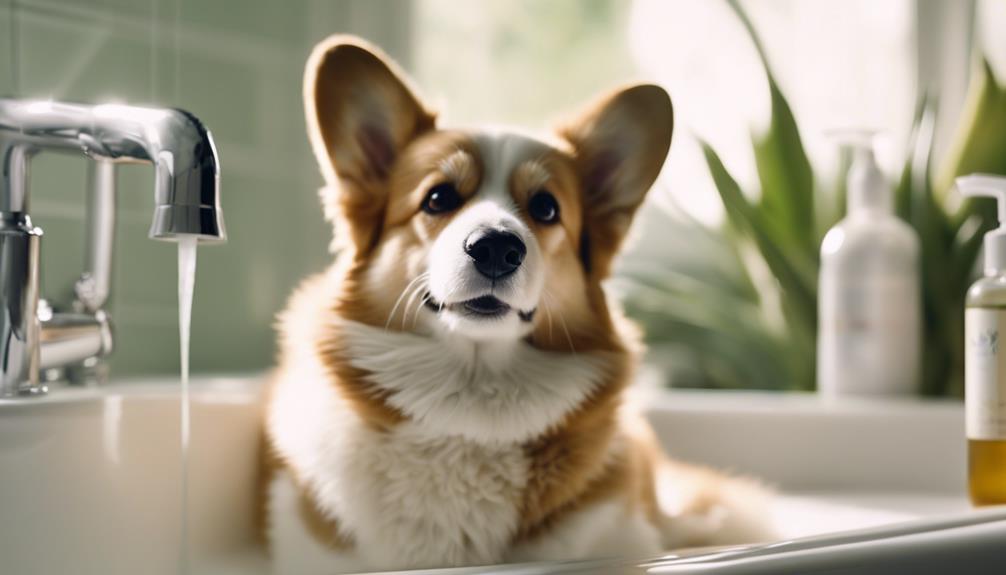
Maintaining proper skin hydration is crucial for your Corgi's overall health and well-being.
Hydrated skin helps prevent issues such as dryness, irritation, and infections, which can affect your pet's comfort and happiness.
In this section, we will explore the best hydrating products available and their importance in your Corgi's grooming routine.
Importance of Hydration
Hydration plays a crucial role in preserving the integrity and health of a Corgi's skin, ensuring it remains supple and resilient against environmental stressors.
Proper hydration benefits include improved skin elasticity, reduced dryness, and enhanced overall coat appearance.
To maintain optimal skin hydration, consider these key hydration sources:
- Fresh Water: Always provide clean, fresh water for your Corgi to drink, as it is the most essential source of hydration.
- Moisture-Rich Foods: Incorporate wet dog food or fresh fruits and vegetables, which can contribute additional moisture to their diet.
- Humidity Levels: Maintain a comfortable indoor humidity level to prevent excessive skin dryness, particularly in winter months.
Best Hydrating Products
Selecting the right hydrating products is essential for promoting optimal skin health in Corgis, as they can significantly enhance moisture retention and protect against dryness. Two highly recommended options are hydrating sprays and moisturizing balms.
Hydrating sprays provide an instant boost of moisture, making them ideal for quick refreshment, especially after walks or playtime. They are easy to apply and often contain beneficial ingredients like aloe vera or chamomile.
On the other hand, moisturizing balms offer deeper hydration, forming a protective barrier on the skin. These balms can be applied to dry areas, like paws or elbows, to prevent cracking.
Identifying Skin Issues
Identifying skin issues in Corgis requires careful observation of their skin condition, including any changes in texture, color, or the presence of lesions.
Common skin ailments can develop quickly if not addressed. It is essential to watch for signs of irritation, which may indicate underlying problems.
Consider these key indicators:
- Redness or Swelling: This can suggest inflammation or infection.
- Flaky or Scaly Skin: Such changes may point to dryness or dermatitis.
- Hair Loss or Bald Patches: This might indicate allergies or parasites.
Regular checks can help ensure early detection of these issues and maintain your Corgi's healthy skin.
Always consult a veterinarian if you notice any concerning symptoms.
Seasonal Grooming Considerations

Seasonal grooming is essential for maintaining your Corgi's skin health throughout the year.
During summer, managing shedding becomes important to keep your home and your pet comfortable, while winter requires special attention to coat maintenance to protect against harsh conditions.
Additionally, allergy season may necessitate specific precautions to reduce discomfort caused by pollen and other allergens, ensuring your Corgi remains happy and healthy.
Summer Shedding Management
Effectively managing summer shedding in Corgis requires a strategic approach to grooming that promotes healthy skin while minimizing excess fur around the home.
During seasonal transitions, several shedding triggers can intensify this process, making consistent grooming essential. To keep your Corgi comfortable and your home fur-free, consider the following:
- Frequent Brushing: Use a slicker brush or an undercoat rake several times a week to remove loose fur and prevent matting.
- Regular Baths: Bathe your Corgi with a gentle shampoo to cleanse the skin and remove dead hair while maintaining moisture.
- Hydration and Nutrition: Ensure your dog has access to fresh water and a balanced diet that supports healthy skin and coat.
Implementing these tips will help manage shedding effectively.
Winter Coat Maintenance
Maintaining your Corgi's winter coat is crucial for ensuring their comfort and protection against harsh weather conditions. During winter, the Corgi coat serves as a barrier against cold temperatures and wind. Regular grooming is essential; brush your Corgi at least once a week to remove loose fur and prevent matting. This practice also helps distribute natural oils, keeping the coat healthy and shiny.
In addition to brushing, consider the following winter care tips:
- Bathtime: Limit baths to maintain natural oils, but ensure your dog is clean.
- Moisturizing: Use a pet-safe moisturizer to prevent dry skin.
These steps will help maintain your Corgi's winter coat and overall skin health.
Allergy Season Precautions
As allergy season approaches, it is essential to implement specific grooming precautions to minimize your Corgi's exposure to allergens and maintain their skin health. Seasonal changes can increase allergens like pollen and dust, which may provoke allergy symptoms in dogs.
To help protect your Corgi, consider these grooming strategies:
- Frequent Bathing: Bathe your Corgi regularly with hypoallergenic shampoo to remove allergens that accumulate in their coat.
- Brushing: Daily brushing helps to remove loose fur and dander, reducing the chance of allergens settling in your home.
- Wipe Down: After outdoor activities, gently wipe your Corgi's paws and belly to eliminate any pollen or irritants they may have picked up.
Professional Grooming Services
Professional grooming services offer specialized care that caters to the unique needs of Corgis, ensuring their skin health and overall well-being. These services provide significant grooming benefits, such as thorough cleaning, dematting, and skin condition assessments.
Professional techniques employed by groomers often include the use of high-quality shampoos, conditioners, and specialized tools that can enhance skin hydration and reduce irritation.
Additionally, regular grooming sessions can help identify potential skin issues early, preventing more severe problems later. Groomers are trained to recognize signs of allergies, infections, or parasites, which can affect a Corgi's skin.

